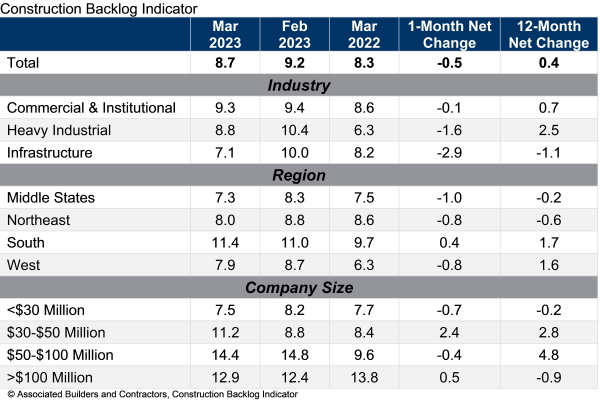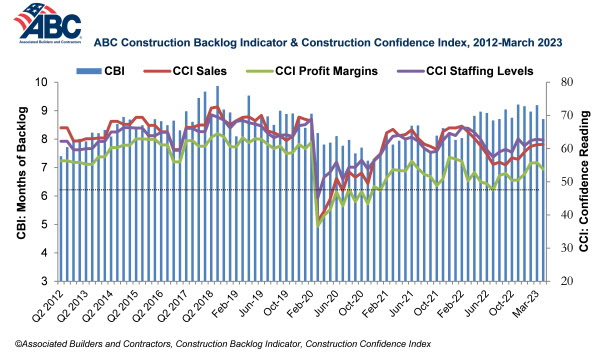Associated Builders and Contractors reported today that its Construction Backlog Indicator declined to 8.7 months in March, according to an ABC member survey conducted March 20 to April 3. The reading is 0.4 months higher than in March 2022.
View ABC’s Construction Backlog Indicator and Construction Confidence Index tables for March. View the historic Construction Backlog Indicator and Construction Confidence Index data series.
Backlog slipped in March and is now at its lowest level since August 2022. Backlog is down on a monthly basis in every region except for the South, which continues to be associated with elevated levels of current and future construction activity.


ABC’s Construction Confidence Index reading for sales inched higher in March, while the readings for profit margins and staffing levels fell. All three readings remain above the threshold of 50, indicating expectations of growth over the next six months.
“The deceleration in nonresidential construction activity may have started,” said ABC Chief Economist Anirban Basu. “With widespread fears of recession, credit conditions tightening and more decision-makers turning their attention to cost containment, new construction work may be more difficult for contractors to line up.
“While the confidence and backlog data weakened in March, they indicate a slowing of activity rather than a shift into reverse,” said Basu. “There is a widely held view that financial conditions are tightening in the aftermath of the failures of Silicon Valley Bank and Signature Bank. To the extent that this is true, one could anticipate further slowing and less industry confidence during the months ahead.”
Related Stories
| Aug 11, 2010
Clark Group, Hensel Phelps among nation's largest federal government contractors, according to BD+C's Giants 300 report
A ranking of the Top 40 Federal Government Contractors based on Building Design+Construction's 2009 Giants 300 survey. For more Giants 300 rankings, visit http://www.BDCnetwork.com/Giants
| Aug 11, 2010
Report: Fraud levels fall for construction industry, but companies still losing $6.4 million on average
The global construction, engineering and infrastructure industry saw a significant decline in fraud activity with companies losing an average of $6.4 million over the last three years, according to the latest edition of the Kroll Annual Global Fraud Report, released today at the Association of Corporate Counsel’s 2009 Annual Meeting in Boston. This new figure represents less than half of last year’s amount of $14.2 million.
| Aug 11, 2010
Peter Marchetto joins Tishman as president of Construction Operations
Tishman Construction Corporation Chairman, Daniel R. Tishman, today announced that Peter Marchetto joined the company as President of Construction Operations.
| Aug 11, 2010
Whiting-Turner, EMJ Corp. top BD+C's ranking of the nation's 40 largest retail contractors
A ranking of the Top 40 Retail Contractors based on Building Design+Construction's 2009 Giants 300 survey. For more Giants 300 rankings, visit http://www.BDCnetwork.com/Giants







